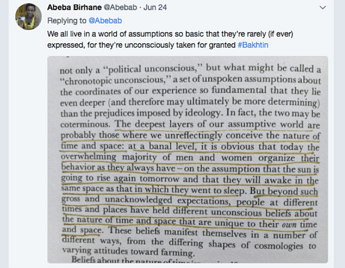There are a number factors that contribute to organisational sustainability. In my experience some key ones are:
- that you have good work with a clear purpose and that the values and vision of the organisation are coherent and alive;
- that people are able to work together and sort out differences;
- that the resources are sufficient - there are enough coming in to support the work that needs to take place.
Financial sustainability has remained a persistent task for GalGael, as it is for many organisations. This was a particular challenge during August and mostly likely for some months to come. It’s an issue that regularly features in posts on the Edgeryders platform and I’m sure there’ll be plenty of experience to share at the Edge of Funding panel planned for OpenVillage.
Supporting the development of program content and other curating work has been welcome respite from these challenges. The fellowship itself affords a bit of time to step back and consider the ‘less urgent’ things about the work. Being caught up in the ‘urgent stuff’ as we so often are in smaller organisations and groups is the space of burnout. We become sucked in to a relentless pattern of activity to secure our survival or just because there are too few people to cover all that needs done. Other forms of organisational and personal sustainability seem less important and while time management tools encourage us to move out of the ‘urgent quadrant’ and spend more time on the important aspects of our work, the reality of achieving this can feel perversely elusive.
The three original themes have been blended for Open Village program to reflect the overlap and interconnection. The fellowship allows me to continue following the thread of the Architectures of Love theme – I’m still curious about where it might lead and what it might reveal. I guess that curiosity stems from a sense of something ‘important’ happening out of the corner of my eye and while all my attention is consumed with numbers, spreadsheets and plans – I’ve never had much chance to give this my full attention. I’m curious to see what would be revealed if we paid more attention to creating the conditions to bring about desired outcomes - such as health in our organisations - rather than see these as ‘outputs’ of our clever plans and policies?
Margaret Wheatley and Deborah Frieze’s book Walk Out Walk On describes the principle of ‘start anywhere, follow it everywhere’. In a world of constant flux it seems like a useful approach and one which they describe as generating changes in education, public safety, arts, ecology and food in Joubert Park in Johannesburg. They make the point that this is a more productive approach than forms of social change dependent on assumptions that large and complex issues must be addressed one by one, with institutions and experts who specialise in that particular problem.
So in ‘following it everywhere’ I’m continuing to look for insights on this topic through conversations, books and reading posts that will help to flesh out the list of ‘enabling factors’ for Opencare/citizen led care suggested early on in the fellowship:
- The skills, forms of awareness, competences, knowledge and practices of individuals
- The designed environment, including public spaces and communal spaces
- Values and a culture of care
- The designed opportunities for interaction, engagement, collaboration
- Commons of all kinds, material sufficiency
One pattern I’ve noticed is the role that language and assumptions play in either creating or shutting down the interior and exterior spaces within us and between us. Both language and assumptions influence all of the factors listed. The language we use is in direct relationship with our assumptions. The words we choose can give away the assumptions we are operating from while at the same time shaping our perceptions. In Ivan Illich’s words; “the present is built on assumptions we haven’t yet found names for.” - they shape our sense of self and others and inform our worldview. They subtly contribute to or degrade the conditions we create. A perspective reinforced by Abeba Birhane’s tweet quoting Bakhtin; “The deepest layers of our assumptive world are probably those where we unreflectingly conceive the nature of time and space”. Assumptions are the hidden architecture but they impact the world around us in ways that are very real.
In the Right to Useful Unemployment, Illich describes “language as the most fundamental of commons” – a commons that perhaps requires more of our attention. Like other commons many terms and words have themselves become enclosed or hijacked; ‘innovation’, ‘resilience’ and ‘empowerment’ are all cases in point. There are many more we could list that have been co-opted for certain agendas. Some words are simply ‘hollowed out’ – words that through mis-use and over extraction lose value and meaning.
Within the care sector, language subtly defines relationships and power. To reference Illich again; “language is about the organisation of power”. Language use informs relationships that either confer agency or create dependency. Perhaps our use of language is the first condition that creates either ‘power with’ or ‘power over’ - something to consider in our care services?
There are clear possibilities that could arise from working consciously with these factors. I’d be curious to hear from others who have intentionally worked with the soft structures that shape our world. My hunch is that this could dramatically increase the scope for radically innovative work that isn’t merely badging new developments with a hollowed out word.
